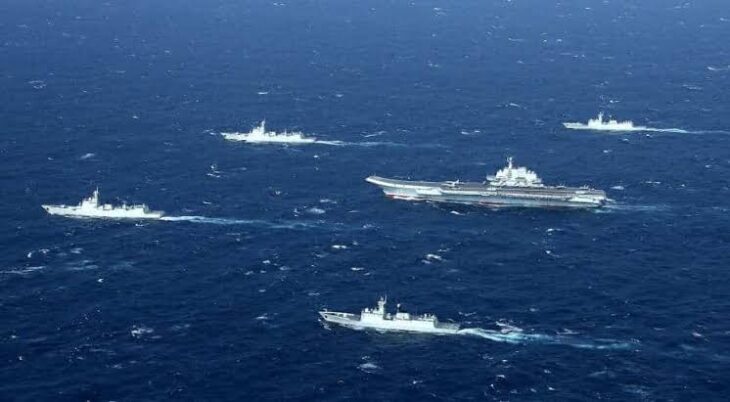TAIPEI, Aug 4 – China fired multiple missiles around Taiwan on Thursday, launching unprecedented military drills a day after a visit by U.S. House of Representatives Speaker Nancy Pelosi to the self-ruled island that Beijing regards as its sovereign territory.
The exercises, China’s largest ever in the Taiwan Strait, began as scheduled at midday and included live-firing in the waters to the north, south and east of Taiwan, bringing tensions in the area to their highest in a quarter century.
China’s Eastern Theatre Command said at around 3:30 p.m. (0730 GMT) it had completed multiple firings of conventional missiles in waters off the eastern coast of Taiwan as part of planned exercises in six different zones that Beijing has said will run until noon on Sunday.
Taiwan’s defence ministry said 11 Chinese Dongfeng ballistic missiles had been fired in waters around the island. The last time China fired missiles into waters around Taiwan was in 1996.

Taiwan officials condemned the drills, saying they violate United Nations rules, invade its territorial space and are a direct challenge to free air and sea navigation.
Tensions had been building ahead of Pelosi’s unannounced but closely watched visit to Taiwan, made in defiance of heated warnings from China.
Before Thursday’s drills officially began, Chinese navy ships and military aircraft briefly crossed the Taiwan Strait median line several times in the morning, a Taiwanese source briefed on the matter told Reuters.
By midday, warships from both sides remained in the area and in close proximity, and Taiwan scrambled jets and deployed missile systems to track multiple Chinese aircraft crossing the line.
“They flew in and then flew out, again and again. They continue to harass us,” the Taiwanese source said.
China, which claims Taiwan as its own territory and reserves the right to take it by force, said on Thursday its differences with the self-ruled island are an internal affair.
“Our punishment of pro-Taiwan independence diehards, external forces is reasonable, lawful,” China’s Beijing-based Taiwan Affairs Office said.
In Taiwan, life was largely as normal, despite worries that Beijing could take the unprecedented step of firing a missile over the main island, similar to a launch by North Korea over Japan’s northern island of Hokkaido in 2017.
Taiwan residents are long accustomed to Beijing’s threats.
“When China says it wants to annex Taiwan by force, they have actually said that for quite a while,” said Chen Ming-cheng, a 38-year-old realtor. “From my personal understanding, they are trying to deflect public anger, the anger of their own people, and turn it onto Taiwan.”
However, Taiwan said that the websites of its defence ministry, foreign ministry and the presidential office were attacked by hackers, and warned of the likelihood of stepped up “psychological warfare” in coming days.
Chinese Foreign Minister Wang Yi called Pelosi’s visit to Taiwan a “manic, irresponsible and highly irrational” act by the United States, state broadcaster CCTV reported.
Wang, speaking at a meeting of Southeast Asian foreign ministers in Phnom Penh, Cambodia, said China had made the utmost diplomatic effort to avert crisis, but would never allow its core interests to be hurt.
Unusually, the drills in six areas around Taiwan were announced with a locator map circulated by China’s official Xinhua news agency earlier this week – a factor that for some analysts and scholars shows the need to play to both domestic and foreign audiences.
On Thursday, the top eight trending items on China’s Twitter-like Weibo service were related to Taiwan, with most expressing support for the drills or fury at Pelosi.
“Let’s reunite the motherland,” several users wrote.
In Beijing, security in the area around the U.S. Embassy remained unusually tight as it has been throughout the week. There were no signs of significant protests or calls to boycott U.S. products.
“I think this (Pelosi’s visit) is a good thing,” said a man surnamed Zhao . “It gives us an opportunity to surround Taiwan, then to use this opportunity to take Taiwan by force. I think we should thank Comrade Pelosi.”
Pelosi, the highest-level U.S. visitor to Taiwan in 25 years, praised its democracy and pledged American solidarity during her brief stopover, adding that Chinese anger could not stop world leaders from travelling there.
China summoned the U.S. ambassador in Beijing in protest against her visit and halted several agricultural imports from Taiwan.
“Our delegation came to Taiwan to make unequivocally clear that we will not abandon Taiwan,” Pelosi told Taiwan’s President Tsai Ing-wen, who Beijing suspects of pushing for formal independence – a red line for China.
“Now, more than ever, America’s solidarity with Taiwan is crucial, and that’s the message we are bringing here today.”
The United States and the foreign ministers of the Group of Seven nations warned China against using Pelosi’s visit as a pretext for military action against Taiwan.
White House national security spokesman John Kirby said earlier in the week that Pelosi was within her rights to visit Taiwan, while stressing that the trip did not constitute a violation of Chinese sovereignty or America’s longstanding “one-China” policy.
The United States has no official diplomatic relations with Taiwan but is bound by American law to provide it with the means to defend itself.
China views visits by U.S. officials to Taiwan as sending an encouraging signal to the pro-independence camp on the island. Taiwan rejects China’s sovereignty claims, saying only the Taiwanese people can decide the island’s future.
Want to send us a story? Contact Shahidi News Tel: +254115512797 (Mobile & WhatsApp)


